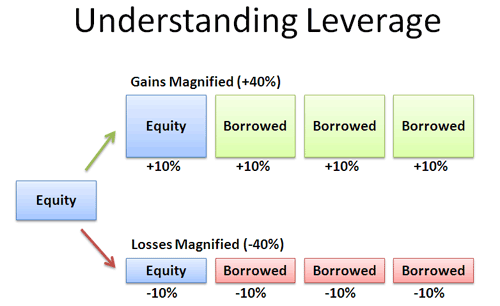Dear Readers,
in the most recent comments, two interesting and fundamental questions have been raised.
Vaguely: "It seems, that with only a small amount of money, I will never be able to make a huge profit." And: "My local bank charges me high fees for converting currency, this will eat up all my profit"
Let me give you a quick answer, before I continue in detail. In modern trading, something called "leverage" has become very popular, especially among small investors. In short, let us say you invest $1000 of your money, the leverage effect will enable you to invest $100.000, depending on the leverage ratio, here 1:100 of course. This has pros and cons, as your yields or losses rise enormously. For instance, I have set up a demo account with $100.000, and as I am trading with a leverage of 1:200, I can now buy currency for $20 million!
 |
| (betterexplained.com) |
This brings me to question number two - the fees. Whenever you buy stocks, currency or anything else traded at a "marketplace", you require a broker. Even if you "buy" your stocks at your local bank, a broker will be involved. Since many years online brokers have changed the world of trading. They offer all kinds of software, that lets you place realtime orders, automate processes, tools for analysis and of course much cheaper fees. E*trade, Scottrade, Wells Fargo, CMC Markets, Trade King, AFA FX are just a few. Many of them "make their money" through the spread of bid and ask price. "This is essentially the difference in price between the highest price that a buyer is willing to pay for an asset and the lowest price for which a seller is willing to sell it." [investopedia.com] So only little or no other fees will be charged.
Let us now take a closer look at how this works at the forex.
You select the pair of currencies with which you wish to make a Forex deal. You determine the volume (the amount of the deal). You deposit the "margin" (collateral needed to facilitate the deal. Usually - only a very small portion of the whole deal, say: 1% or 1:100).
When your Forex deal is running, you can monitor its status and check scenarios online, whenever you wish. You may change some terms in the deal, or close it. Ultimately, you remain in control, only you can decide when the time is right to cash in your profit!
Some Forex brokers will even let you determine a "take-profit" rate, with which the deal will close automatically for you, when and if such rate occurs in the market. Meaning: you do not have to stay near your computer waiting for the right moment, you can go to work, go shopping, or even got to the beach while the money is rolling in! On the other hand you should also set up a stop (or stop-loss) for your trade, in order to avoid high losses.
Very informative post! Thanks.
ReplyDeleteGood tips! Thx!
ReplyDeletenice post i like it !
ReplyDeleteI like this post. whats the minimum amount of money necessary to start making serious profit through trading?
ReplyDeletedigging it, thanks for sharing dude
ReplyDeleteNice info!
ReplyDeleteI need this... I want to be rich
ReplyDeletegreat, this is awesome
ReplyDeletethanks for the update
ReplyDeleteI never thought about it that way
ReplyDeletenice, thanks for sharing
ReplyDeletegood post, can't wait for more
ReplyDeletethis is great!
ReplyDeletewow, good info here
ReplyDeletehelpful, thanks for this.
ReplyDeleteunbelievable , man
ReplyDelete